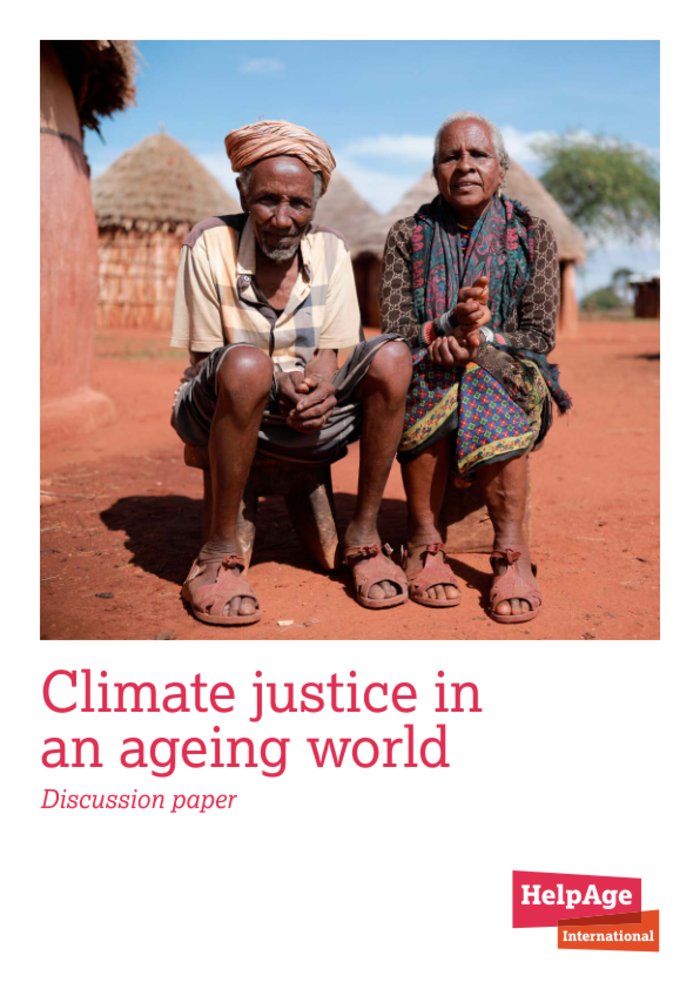
HelpAge’s new report highlights the critical link between ageing populations and climate change, ahead of COP28 climate talks.
The world is turning a blind eye to the need to address the profound link between the rapidly ageing population and climate change – leaving older people invisible in debates about how to address the crisis.
With HelpAge’s new report on climate change, we look at what is happening around the world and share recommendations for a more inclusive response to climate change.
Intersection between climate change and population ageing
The ageing population is triggering one of the most significant social changes across the world, with almost every country experiencing an increase in the number and proportion of older people. This means that as global temperatures rise, climate related hazards affect an ever-increasing proportion of older people.
“Almost 138 million people aged over 60 (close to 14 per cent of the global over-60 age group) are already exposed to climate risks.” – Source UNFPA.
How are older people affected by climate change?
Older people are more prone to the effects of extreme temperatures – both hot and cold – as they can struggle to regulate their body temperatures, especially if they have a pre-existing condition like heart disease, diabetes, and dementia.
“ In the 2022 European summer, 9,226 heat-related deaths were recorded among people aged 65–79 years, increasing to 36,848 deaths for those aged 80 and over.”
And when climate related natural disasters hit – like flooding, drought and wildfires – it is older people who are often the worst affected, particularly when they lead to the collapse of the health systems that so many depend on.
“In the Philippines, more than 40 per cent of the people who died because of Typhoon Haiyan in 2013 were older.”
How does climate change challenge low- and middle-income countries?
The high level of dependence on natural resources and agriculture in low- and middle-income countries makes them more vulnerable to the impacts of climate instability. With the agricultural sector, including semi-subsistence agriculture, occupying a significant proportion of the labour force, anything that causes crops to fail can have a devastating impact on livelihoods.
This is exacerbated by the already high levels of poverty and general lack of social protection.
According to FAO, over 34 per cent of crop and livestock production loss in low- and middle-income countries is because of drought and costs the sector US$37 billion overall.
A World Bank 2021 report also indicates that around 216 million people, mostly from developing countries, will be forced to flee their homes because of climate change impacts by 2050 unless radical action is taken. Since 2010, weather emergencies have already displaced around 21.5 million people a year.
What can older people contribute to the fight against climate change?
Older people should not be perceived as bystanders in climate action. They have distinctive capacities and contributions to make through their knowledge gained from a lifetime of experience, skills and capabilities that allow them to make significant contributions to climate action.
They also have a high level of social standing in many communities, enabling them to act as mobilisers and organisers in the efforts to fight climate change. They provide a valuable role in their communities through sharing their knowledge of caring for nature and the environment.
What needs to be done towards age-inclusive climate action?
The gap between climate change and population ageing must not be ignored in the discourse about the climate crisis.
HelpAge’s report makes the following recommendations for governments, climate activists, donors, international climate community ahead of COP28 climate talks this year.
- Integrate ageing into future climate studies, including scientific publications on climate change.
- Strengthen public policies that boost lifetime resilience ageing into policies aimed at preventing, responding, and recovering from natural disasters.
- Empower older people through creation of awareness campaigns focused on age-sensitive information about climate change and environmental activism.
- Support intergenerational dialogues to develop mutual understanding of respective capabilities and vulnerabilities and to define a common action agenda for climate change adaptation, mitigation, and nature conservation.
- Provide support to the most vulnerable older people, including the rural poor, women-headed households, and indigenous groups, and harness the financial potential of pension funds for climate actions.
What is expected from the international community?
At COP28 the international community must not ignore the intersection of global ageing and the climate crisis – particularly in low and middle-income countries. Immediate action is needed to include the issue of global ageing in the climate conversation, as the window of opportunity to act shrinks at an alarming rate.
